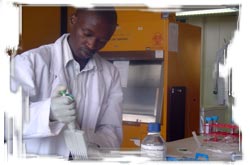CIMMYT E-News, vol 3 no. 1, January 2006
 A new DNA detection service provided by CIMMYT and KARI responds to African researchers’ calls for modern technology.
A new DNA detection service provided by CIMMYT and KARI responds to African researchers’ calls for modern technology.
African maize breeders now have access to state-of-the-art biotechnology tools thanks to a service launched by CIMMYT and the Kenya Agricultural Research Institute (KARI). Housed within the laboratories at the International Livestock Research Institute (ILRI) headquarters in Nairobi, under the Canadian International Development Agency (CIDA)-funded Biosciences Eastern and Central Africa (BECA) platform, the lab offers and trains researchers in the use of molecular marker techniques.
The molecular markers are DNA snippets that help researchers locate and select for genes associated with traits of interest, including resistance to pests and diseases, or tolerance to stresses like drought. With markers, breeders can cut the time and money needed to develop plant types that possess such useful traits. Until now, this capability had been unavailable to scientists in sub-Saharan Africa, outside of South Africa.
Led by CIMMYT biotechnologist Jedidah Danson and supported by the Rockefeller Foundation, the service now has its hands full of requests from breeders working with CIMMYT, national agricultural research systems, local seed companies, and universities. “They’ve learnt of the service entirely through word-of-mouth,” she says. “It’s especially attractive because current funding allows us to offer the service free, so more breeders are exposed to the technology.”
Breeders using the service are especially interested in finding ways to incorporate resistance to maize streak virus, a disease endemic in much of sub-Saharan Africa and in enhancing the nutritional quality of herbicide tolerant maize, originally developed as part of a package to control the parasitic witch weed.
“Marker assisted selection is an important tool for breeders in Africa. CIMMYT and KARI must be lauded for being the first in the region to provide the service to public sector researchers,” says Richard Edema, molecular breeder at Makerere University, Uganda. Edema is also coordinator of the African Molecular Marker Application Network, a consortium of about 100 biotechnologists and breeders from across sub-Saharan Africa.
Danson is building a database of markers for genes for resistance to important pests and diseases, including maize streak virus, gray leaf spot, the parasitic weed Striga, and northern corn leaf blight. She also helps train breeders in the effective use of markers. “Clearly, our partnership to support African breeders was long overdue,” she says.
For more information contact Jedidah Danson (j.danson@cgiar.org)

